Countless musicians have composed music, but only a tiny handful have become canonized greats.
What might these individuals with vastly different backgrounds share in common?
Today, we’re looking at the backgrounds of fifteen beloved composers, from Johann Sebastian Bach (born in 1685) to Benjamin Britten (born in 1913), to see how the musicality of their families may – or may not – have contributed to their talent and influenced their work.
Were the great composers’ parents musical? Here’s what we found out.
Johann Sebastian Bach (1685-1750)

Johann Ambrosius Bach, J.S. Bach’s father
His father was Johann Ambrosius Bach, the director of the town musicians. Johann Ambrosius came from a large, sprawling family of musicians.
His mother was Maria Elisabeth Lämmerhirt, a childhood friend of Johann Ambrosius’s. Her father was a furrier and coachman. It’s unknown whether she had musical interests.
Verdict: His father was musical. We don’t know about his mother.
Learn more about Bach’s childhood.
Glenn Gould Plays Bach’s Goldberg Variations
Joseph Haydn (1732-1809)

Haydn in London
His father was Mathias Haydn, a wheelwright and village leader.
Mathias loved music. One biographer who interviewed Joseph wrote:
The father had seen a bit of the world, as was customary in his trade, and during his stay in Frankfurt am Main he had learned to strum the harp. As a master craftsman in Rohrau, he continued to practice this instrument for pleasure after work.
Joseph’s mother was Maria Haydn, née Koller.
She worked as a cook before her marriage, but was a music enthusiast, just like her husband. She loved to sing with him and the rest of the family.
Verdict: Both of his parents were musical.
Learn more about Haydn’s childhood.
Joseph Haydn Piano Sonata No. 59 in E flat, Hob. XVI:49
Wolfgang Amadeus Mozart (1756-1791)

Leopold Mozart
Wolfgang’s father was Leopold Mozart, a professional performing musician and music teacher, who began working for the Prince-Archbishop of Salzburg in 1743. He also composed, although his pedagogical works were more successful than his music.
His most successful professional project was teaching and promoting his two prodigy children, Maria Anna Mozart and Wolfgang Amadeus Mozart.
Wolfgang’s mother was Anna Maria Mozart, née Pertl. Her father was a talented musician, but worked in bureaucracy, serving as a district superintendent.
Verdict: His father was musical, and his mother came from a musical family.
Learn more about Mozart’s busy childhood.
Itzhak Perlman Plays Mozart’s Adagio for Violin and Orchestra
Ludwig van Beethoven (1770-1827)

Johann and Maria Magdalena van Beethoven © Wikipedia
His father was Johann van Beethoven, a professional musician who, at the time of his son’s birth, was working at the court in Bonn.
Johann was primarily a singer, but he also played the violin and taught keyboard instruments. His life was marred by alcoholism, as well as the resulting abuse of his talented son.
Ludwig’s mother was Maria Magdalena Beethoven, née Keverich, the daughter of a chef. We don’t know if she shared his musical interests.
Verdict: His father was musical.
Learn more about Beethoven’s tragic childhood.
Beethoven: Violin Romance, Op. 40
Frédéric Chopin (1810-1849)
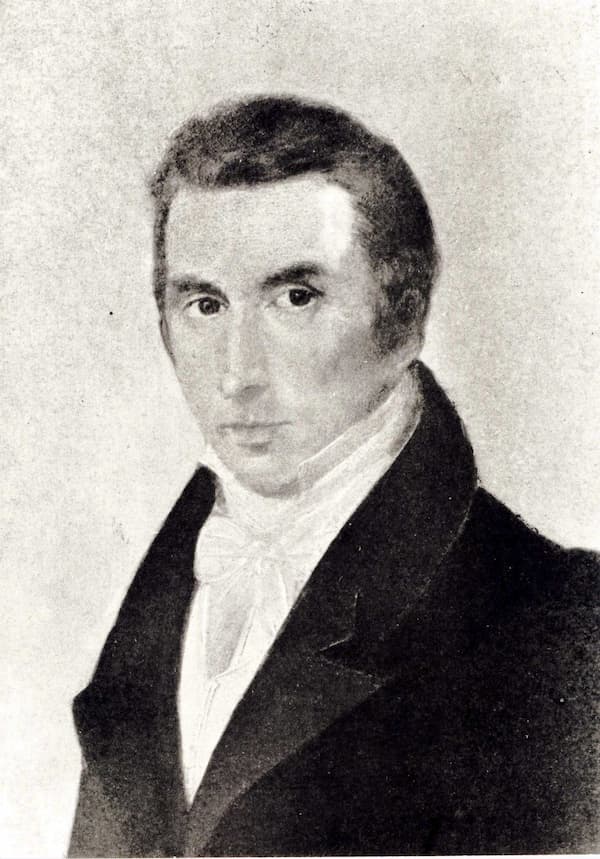
Mikołaj Chopin © Wikipedia
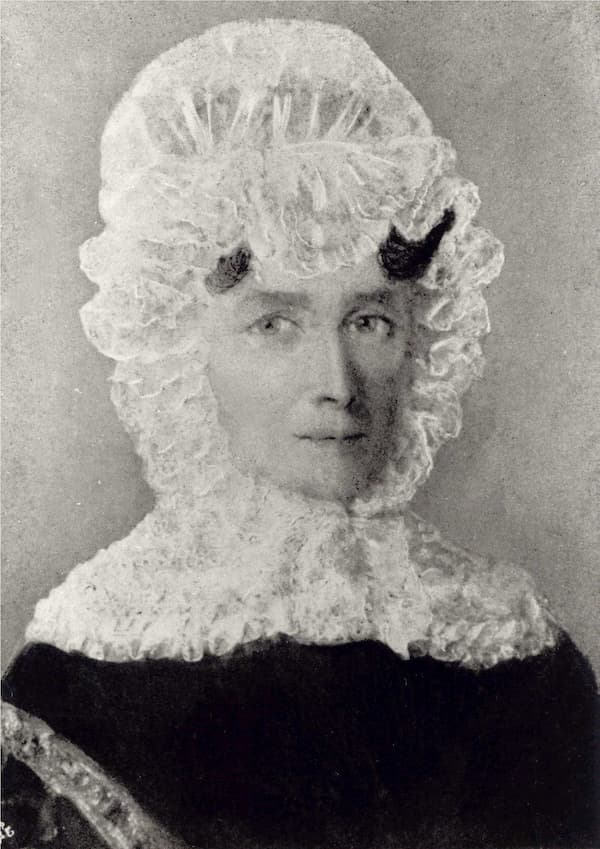
Justyna Chopin, née Krzyżanowska © Wikipedia
His father was a Frenchman named Nicolas Chopin, who worked as a tutor and teacher. He played the violin and flute.
Frédéric’s mother was Tekla Justyna Chopin, née Krzyżanowska. She played piano and even taught music to Nicolas’s students.
Verdict: Both of his parents were musical.
Learn more about Chopin’s idyllic childhood.
Chopin: Nocturne, Op. 27 No. 2
Richard Wagner (1813-1883)

Richard Wagner and family in 1881. Left to right, top row: Blandine von Bülow, Heinrich von Stein (Siegfried’s tutor), Cosima Wagner, Richard Wagner, Paul von Joukowsky (family friend); bottom row: Isolde, Daniela von Bülow, Eva, Siegfried © Wikipedia
His father was Carl Friedrich Wagner, a clerk who worked for the Leipzig police. He died just six months after Richard was born, meaning Richard had no memory of him.
Richard’s mother was Johanna Rosine Wagner, née Pätz. Soon after her husband’s death, she moved in with one of his friends, an actor and playwright named Ludwig Geyer, and they embarked on a romantic relationship. Richard even used his last name, and likely believed that Geyer was his biological father.
Verdict: Neither parent was musical…although his stepfather was very creative and artistic.
Learn more about Wagner’s childhood.
Richard Wagner: Tristan und Isolde
Johannes Brahms (1833-1897)

Johann Jakob Brahms
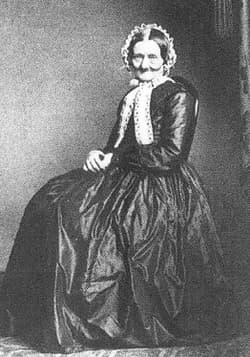
Christiane Nissen Brahms
His father was Johann Jakob Brahms, who had pursued a career in music against his family’s wishes. He was a professional double bass player and horn player.
Johannes’s mother was Johanna Henrika Christiane Brahms, née Nissen. She was a seamstress who had resigned herself to a life as a spinster until Johann Jakob, seventeen years her junior, proposed to her.
Verdict: His father was musical.
Learn more about Brahms’s family life.
András Schiff Plays Brahms Intermezzo in A major op.118 no.2
Gustav Mahler (1860-1911)

Bernhard Mahler © mahlerfoundation.org
His father was Bernhard Mahler, who started his career as a street peddler and eventually saved up enough to become a coachman and innkeeper.
Gustav’s mother was Marie Mahler, née Herrmann, the daughter of a soapmaker.
When he was four years old, Mahler started playing his grandparents’ piano. Later, his father supported his musical studies and his goal to attend the Vienna Conservatory.
Verdict: Neither parent was musical.
Learn more about Mahler’s grim, morbid childhood.
Gustav Mahler: Adagietto
Claude Debussy (1862-1918)
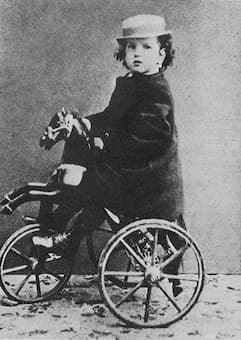
Claude Debussy as a child, 1867
His father was Manuel-Achille Debussy, who ran a china shop that would eventually fail, and then worked in a printing factory and as a bookkeeper. He also served in the marine infantry and hoped that his son would go into the military, too.
Claude’s mother was Victorine Debussy, née Manoury. She worked as a seamstress.
In 1870, the young family fled Paris during the Franco-Prussian War. Manuel’s sister was actually the first person to suggest young Claude take piano lessons.
Verdict: Neither parent was musical.
Learn more about Debussy’s isolated childhood.
Aldo Ciccolini Plays Debussy
Jean Sibelius (1865-1957)

Christian Sibelius © hmlmuseo.fi
His father was Christian Gustaf Sibelius, a medical doctor and amateur cellist. He died of typhus when Sibelius was just three years old.
Jean’s mother was Maria Charlotta Sibelius, née Borg. After her husband died, she moved in with her widowed mother.
Jean’s maternal uncle Pehr Ferdinand, who had become a substitute father figure, was fascinated by music, and Jean was in turn inspired by him.
Verdict: His father was musical, and his mother came from a musical family.
Learn more about Sibelius’s extremely Finnish childhood.
Boris Giltburg Performs Sibelius’ Valse Triste
Maurice Ravel (1875-1937)

Pierre-Joseph Ravel © Wikipedia
His father was Pierre-Joseph Ravel, a Swiss civil engineer and inventor. He was also an amateur musician. Maurice later recalled:
Throughout my childhood, I was sensitive to music. My father, much better educated in this art than most amateurs are, knew how to develop my taste and to stimulate my enthusiasm at an early age.
Maurice’s mother was Marie Ravel, née Delouart. She came from a difficult family background: she was illegitimate and barely literate. She was also of Basque-Spanish origin, and the influence of the music from this area would run strong in her son’s music.
Verdict: His father was musical.
Learn more about Ravel’s close-knit childhood.
Ravel: La Valse / Bernstein
Béla Bartók (1881-1945)

Voit Paula © Wikipedia
His father was also named Béla Bartók. He was the director of an agricultural school, as well as an amateur cellist and pianist. He died when his son was just seven years old.
Young Béla’s mother was Paula Bartók, née Voit. She was a pianist and introduced her son to music at an early age.
By the time he was four, he had forty small pieces in his piano repertoire. She began giving him official lessons the following year and oversaw his first public performances.
Verdict: Both his parents were musical.
Learn more about Bartók’s Hungarian childhood.
Martha Argerich and Nelson Goerner Perform Bartok’s Sonata for Two Pianos and Percussion, Sz. 110
Dmitri Shostakovich (1906-1975)
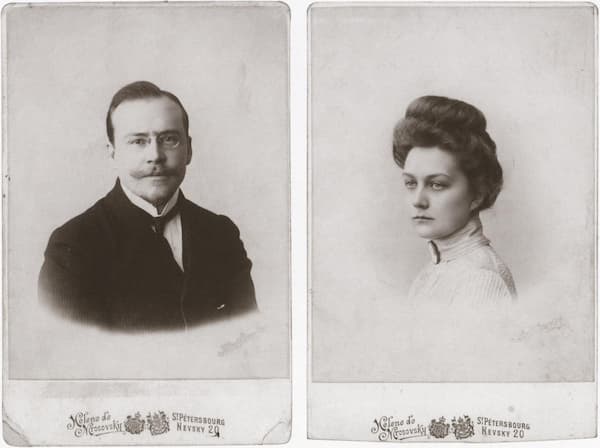
Dmitri’s parents, Dmitri Boleslavovich Shostakovich and Sofia Vasilyevna Kokoulina
© Dmitri Shostakovich: Pages of His Life in Photographs/Olga Dombrovskaya
His father was Dmitri Boleslavovich Shostakovich, an engineer who studied physics and mathematics.
Young Dmitri’s mother was Sofiya Vasilievna Kokoulina. She was a talented amateur pianist. Oftentimes as a child, Dmitri would play by ear what he’d heard his mother play.
Verdict: His mother was musical.
Shostakovich: Symphony No. 5
Benjamin Britten (1913-1976)

Robert Victor Britten © National Portrait Gallery, London

Edith Rhoda Britten (née Hockey) © National Portrait Gallery, London
His father was Robert Victor Britten, a man who had once dreamed of living a bucolic life as a farmer but went into dentistry instead. He was indifferent to music.
Benjamin’s mother was Edith Rhoda Britten, née Hockey. She was a talented amateur musician and a leader in the local Lowestoft Musical Society.
She was delighted when Benjamin’s musical talent began to assert itself, and encouraged him when he began composing at the age of five.
Verdict: His mother was musical.
Benjamin Britten: Serenade for Tenor, Horn and Strings op. 31
A Few Closing Observations
Keeping in mind that our sample size is small (then again, the crop of Great Composers is also quite small!)…
Sixty per cent of these composers had musical fathers or fathers who came from musical families.
Forty-seven per cent had musical mothers or mothers who came from musical families.
A third of the composers, or thirty-three per cent, came from families where both parents were musical or came from musical families.
And, intriguingly, twenty per cent came from families where neither parent was musical.
From Bach’s time to the dawn of the nineteenth century, having a musical father seems to have been an important factor in whether a boy would grow up to become a Great Composer.
However, in the nineteenth century, when women were encouraged to study music more seriously, they were more likely to become the parents to introduce their Great Composer son to music.
Maybe that’s also due to the fact that pre-1800, many families specialised in a particular field together.
In the end, the bottom line seems to have been: it probably helped to have at least one musical parent, but it certainly wasn’t a deal breaker if you didn’t. Just ask Wagner and Mahler.
So whether you come from a musical family or not, take heart that the art has space for you.
For more of the best in classical music, sign up for our E-Newsletter



